by Amalia Vagts, Executive Director
with gratitude for input from others in the LGBTQ community
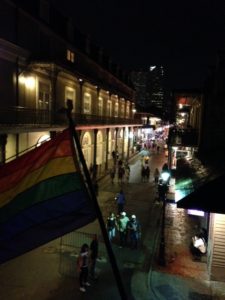
I’ve just returned from the 14th ELCA Churchwide Assembly and inaugural Grace Gathering in New Orleans, attending in my capacity as executive director of Extraordinary Lutheran Ministries. For me, the week was a combination of joy, sadness, growth, challenge, gratitude, disappointment, and a deepened commitment to proclaim the good news. Hey, sounds like church!
I was reminded of what called me to engage in this ministry in the first place. My fire has been lit with resolve. We’ve got work to do.
Seven years and three assemblies after changing church policy to affirm the calls and relationships of LGBTQ people, our community was largely invisible in the programming throughout the week. I’m thankful for all the thought and hard work that went into an increasingly wonderfully diverse and multi-perspective assembly. I’m thankful for the provoking and energizing conversations about racism, racial equality, and white privilege. It was fantastic to see how much is changing! Our church could have also delighted this past week in celebrating LGBTQ folks as we rightfully celebrate the growing, gorgeous and long overdue overall diversity of our denomination. There are now 659 Reconciling in Christ ministry settings, with another 430 on the journey. There are 230 openly LGBTQ pastors, deacons, and candidates for ministry. There are congregations that have formed or grown because of the ELCA’s deepening welcome of LGBTQ people. All cause for great joy – yet, our church leaders missed many opportunities to celebrate this good news and the gifts of LGBTQ people.
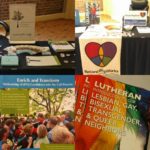
Because there was no formal space for LGBTQ people at this assembly, Extraordinary Lutheran Ministries and ReconcilingWorks created it for LGBTQ people and allies at co-led events throughout the week. We met for daily prayer – five of these led by openly LGBTQ ministry leaders, and one by an ally bishop. The gathered group ranged from 30 – 75 each day. It was amazing to have that space with our people and our allies. I’m grateful especially to our allies for their commitment. Some people commented about how they had to “figure out where the LGBTQ people were.” At future assemblies, we hope to see more publicity about LGBTQ-led opportunities in order bring more awareness to those not yet familiar with the many ELCA people working in support of a church that celebrates diverse sexual orientations and gender identities and expressions.
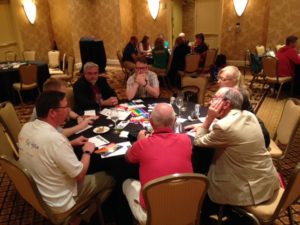
Midway through the week, we co-hosted a reception and working conversation at a hotel across the street from the Convention Center.
Nearly 100 people (including four ELCA bishops) gathered for community and socializing. After the reception, about half the group stayed for conversation in small groups. We invited conversation about what LGBTQ people and friends need as we look ahead to 2019. That year will be the 10th anniversary of the policy change that began to recognize same-sex relationships and welcome partnered LGBTQ people to serve as rostered leaders. We asked people to share a word to describe the current state of LGBTQ people in the ELCA, to consider what LGBTQ people in the ELCA still need and to reflect on why they stay in the struggle.
There were two consistent themes in these conversations – invisibility and possibility.
Many LGBTQ people and allies felt invisible this past week. As we see the beautiful changes coming from a deepened understanding of what the church receives when we welcome, affirm, and include diverse voices, faces, languages and cultures – we long for our LGBTQ identities to become part of that richness. Those who are LGBTQ and know others in the community felt comforted to see familiar LGBTQ faces in worship and to see LGBTQ people and allies as leaders and voting members throughout the week. Yet others newer to our church had no idea that they were among friends. You can’t see we’re LGBTQ by looking at us. LGBTQ people need to claim our own identities, and our allies must name us in order for our diversity to be known. We lament the invisibility of LGBTQ people among those explicitly celebrated in the hall and in worship. It is our sincere hope and prayer that future assemblies will visibly celebrate the gifts of LGBTQ people and worship leaders.
Many LGBTQ people and allies saw the possibility of how our church can move forward in great ways this past week. We have hope for the possibility of a richer kingdom when LGBTQ voices and faces are celebrated. We align with others who feel invisible and filled with possibility – and we are filled with resolve to help our church continue to move forward to that great day.
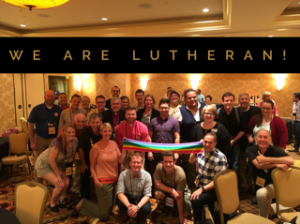
We have begun to experience how good the church can be when we break from a narrow understanding of church dominated by white Northern European culture. We are all connected in this journey – especially those of us seeking to lead from the margins. What joy awaits this church as we continue to break open the racism, patriarchy, heterosexism, homophobia and transphobia, ableism, classism and sexism which continue to confine us.
As we do the hard work, we more clearly see the possibility of becoming a church transformed by the named and celebrated gifts of all people.
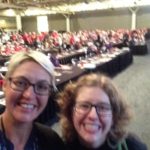 Amalia Vagts (pictured here on the assembly floor with Proclaim member Rev. Emily E. Ewing) was on the floor “legally” for the first time this year (was also there as a peaceful protester in 2005). This year, she especially enjoyed seeing young people at the microphones, conversations about race from a fantastic variety of perspectives, would love to hear Leymah Gbowee speak every single day, and appreciated hallway conversations during this churchwide assembly – with those committed to our work, those who’ve never heard of us, and those who need our work but can’t yet be public about it.
Amalia Vagts (pictured here on the assembly floor with Proclaim member Rev. Emily E. Ewing) was on the floor “legally” for the first time this year (was also there as a peaceful protester in 2005). This year, she especially enjoyed seeing young people at the microphones, conversations about race from a fantastic variety of perspectives, would love to hear Leymah Gbowee speak every single day, and appreciated hallway conversations during this churchwide assembly – with those committed to our work, those who’ve never heard of us, and those who need our work but can’t yet be public about it.

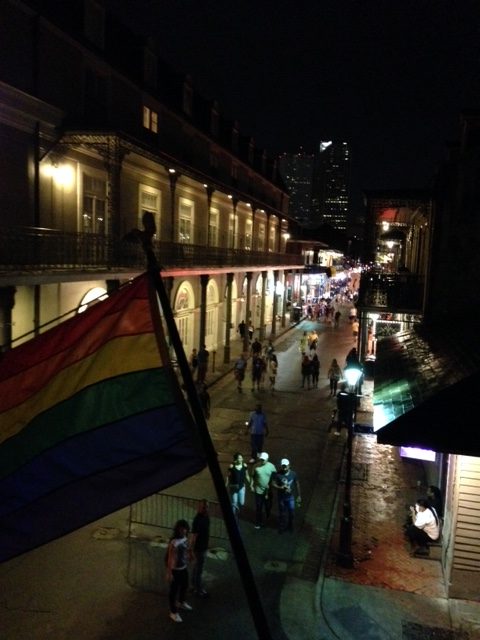

Thank you for this. It’s good to hear! And it’s important to gain a sense of the challenges that are ahead. Thank you Amalia for your leadership and for your presence at CWA.
Is there any truth to the rumor that reparative therapy was being discussed and/or in any way supported? I heard that in an effort to be inclusive of multiple perspectives that RT was included as an option for congregations to consider. (This was reported on another FB page) RT is illegal in NJ – and for good reason. I sincerely hope we’ve moved past such nonsense.
Our church has recently published research about the widening leadership gap for congregations. The gap between the number of congregations that can afford to call a full time pastor and the number of pastors available for those calls has grown from less than 1% to now 13% in the last 10 years, and is still growing. Somewhere around 25-30% of last year’s entering class at LSTC identify as LGBTQ. Were it not for them and their LGBTQ peer seminarians, pastors and future seminarians, this ‘disparaging’ leadership gap – as the church (members and leaders) is willing to describe it, would be EVEN GREATER. Now while there are growing numbers of congregations without a pastor, there are too many LGBTQ candidates waiting for calls (some for years). And so the church, the ELCA, needs Reconciling Works and Extraordinary Lutheran Ministries to do the holy work of preparing congregations to welcome LGBTQ leaders to be people of faith with them and faithful leaders among them. Otherwise, we’ll all continue to watch that gap (a gap filled with unnecessary tears, I’d say) grow even wider.
How amazing would it be Church transformed utilizing the gifts of all. I pray for that day.
As a member of a majority who is generally accepted ( white hero male) I know of what you speak regarding no special attention.
Acceptance is a good and right thing, but it will lead to and may have already lead to there being no need to have a special booth, I doubt the white over 40 hero men of the elca had a booth.
Honestly I pray for a day when there is no need to have any special attention given to any one facet of our church family! only the cross…..